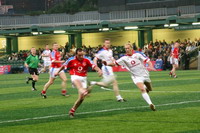Ireland's top Gaelic football and hurling stars to strike over lack of pay
Ireland's top Gaelic football and hurling stars will organize the first strike in the 123-year history of their homegrown and widely popular sports.

The challenge from the Gaelic Players Association, which wants the athletes to start getting paid, threatens to topple one of the world's last remaining bastions of amateur sports. For decades, part-time and unpaid Gaelic athletes have played for the pride of representing their native Irish county.
The players' union said it sent strike ballots to 1,881 players on the rosters of each of Ireland's 32 county football and hurling teams. More than 71 percent replied, of which 95 percent authorized a strike.
If it proceeds, the strike would cancel January's preseason games and the February start to the 2008 season, which involves county teams in both field sports vying for an All-Ireland Championship played each September in Dublin's 82,000-seat Croke Park stadium. Lower-level club competitions would not be disrupted.
The Gaelic Athletic Association - a pillar of Irish nationalism that began organizing native sports in 1884 as a way to rebel against British rule - said it regretted the strike vote and blamed the government for the dispute.
Sports Minister Seamus Brennan declined to comment.
The GAA is Ireland's dominant sports organization and oversees an empire of stadiums, sponsorships, events management and more than 2,500 grass-roots clubs. Gaelic games are by far the best organized, best financed and most popular sports events in Ireland, particularly outside Dublin.
Since 1999 the elite county-level players have been agitating for a slice of the GAA's swelling income, which is augmented by hefty government aid. They argued that modern-day pressures and training demands involved considerable sacrifice and lost career opportunities in their weekday jobs.
Their anger grew after the government in 2002 began offering tax breaks to Ireland's paid athletes - a rule that put more money in the pockets of multimillionaire golfers and soccer stars, but offered nothing to Gaelic's amateurs.
In January, the government proposed to pay "grants" indirectly to members of county teams by giving 5 million EUR(US$7.3 million) extra to the Gaelic Athletic Association. But, fearing this could be a first step to turning Gaelic players into salaried professionals, both the government and GAA since have bickered over the rules for doling out these so-called "player welfare supports."
In its statement Friday, the GAA stressed it wanted the government to pay players through a third body, the Irish Sports Council. It argued that direct payments from the GAA to players would have "serious implications for the word and spirit of amateur status."
The money on offer amounts to a maximum 2,800 EUR(US$4,100) annually per player - peanuts by pro standards.
But many Gaelic enthusiasts fear that going down this road will end in a fully pro-style structure. Their biggest fear: that athletes might be able to abandon their home county and go to the highest bidder, ruining the fiercely held loyalties that make Gaelic competitions so intense.
In a statement, the players union said the government and GAA were demonstrating a "genuine commitment" to brokering a deal before the new season.
"However, while there is optimism, we remain resolute that we will carry out our strike action should the impasse continue indefinitely," it said.
Subscribe to Pravda.Ru Telegram channel, Facebook, RSS!


